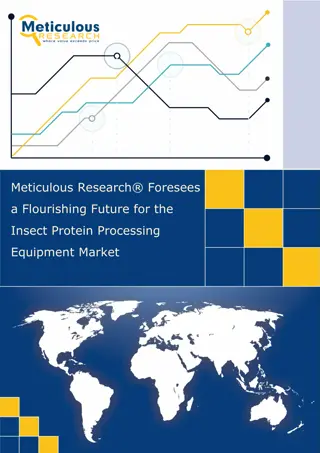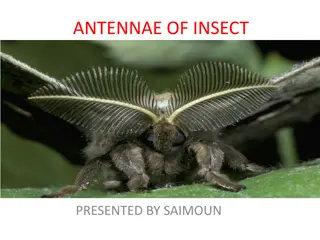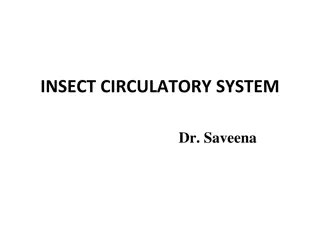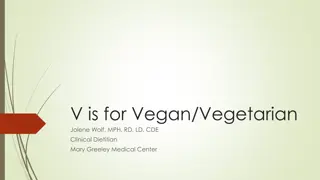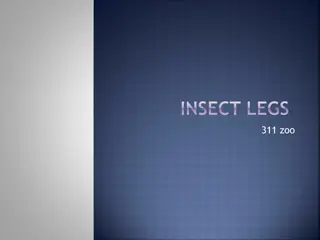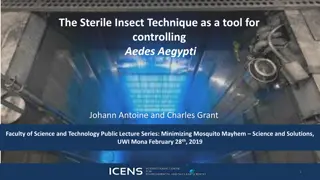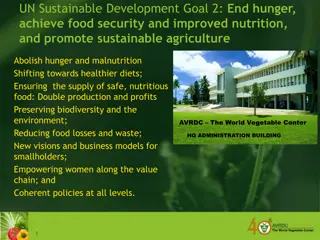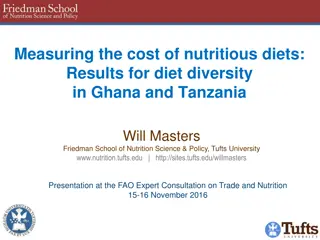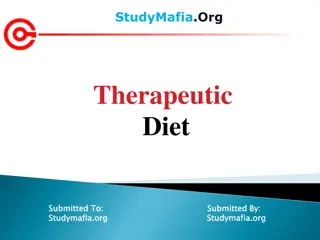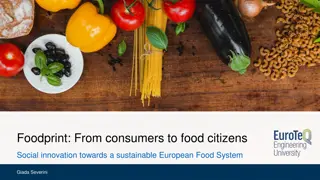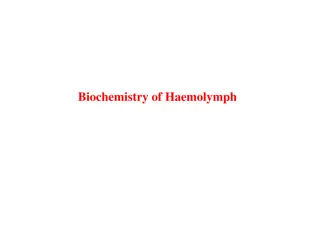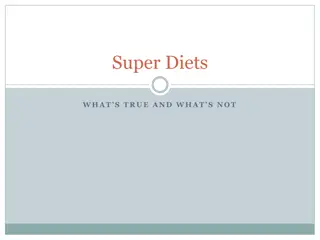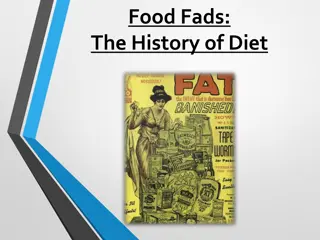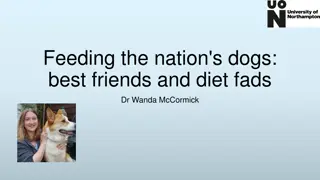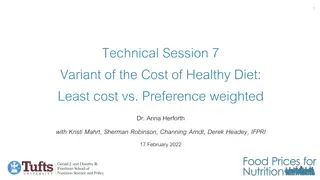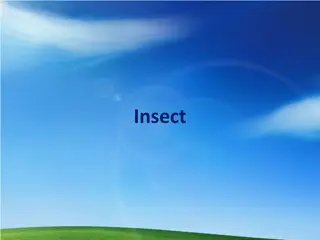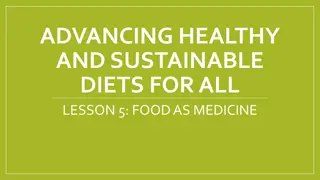Embracing Insect-Based Diets for a Sustainable Future
Emphasizing the urgency of meeting the growing protein demand sustainably, the article explores the benefits of entomophagy - consuming insects as food. Experts advocate for insect-based diets to address environmental concerns, citing insects as a rich protein source with lower greenhouse gas emissions and higher feed conversion rates compared to livestock. Insect farming offers a promising solution to food security challenges while reducing waste and resource consumption.
Uploaded on Sep 21, 2024 | 0 Views
Download Presentation

Please find below an Image/Link to download the presentation.
The content on the website is provided AS IS for your information and personal use only. It may not be sold, licensed, or shared on other websites without obtaining consent from the author.If you encounter any issues during the download, it is possible that the publisher has removed the file from their server.
You are allowed to download the files provided on this website for personal or commercial use, subject to the condition that they are used lawfully. All files are the property of their respective owners.
The content on the website is provided AS IS for your information and personal use only. It may not be sold, licensed, or shared on other websites without obtaining consent from the author.
E N D
Presentation Transcript
IGCSE exam prep Question 3 - Summarising
Question 3 -Summarising Question 3 asks you to SUMMARISE part of a text or article Summary - What to do? Identifying the key points from the article (look at the marks available for an indication of how many you should extract (Usually 15) Identifying those points that respond directly to the question. Being careful not to change the meaning, summarise the key facts you have identified in your own words. Notes from the Examiner Easy to pick up a lot of marks. Candidates must be aware that the meaning must not change Inclusion of material outside the passage is also not rewarding and is distracting
We take our seats at a long, high table as Reade and Evans wheel in a trolley loaded with our meals. We each receive a different main course. I get the Asian-style noodles and fixate on the bug I can see. That s a locust, Reade says. [It] was alive this morning. Very fresh. But he s much more excited about another, hidden ingredient: fat extracted from the larvae of black soldier flies (or, to put it less delicately, maggot fat). The whole dish has been stir-fried in it. I believe you re the first human being on the planet to have ever been served anything cooked with this, Reade tells me. But not to worry: I ve eaten some of it myself, an hour ago. I m still alive. I inspect my plate. Reade urges us to begin: Eat before it gets cold. The next morning, Reade and Evans join 450 of the world s foremost experts on entomophagy, or insect eating, at a hotel down the road in Ede. They are here for Insects to Feed the World, a three-day conference to promote the use of insects as human food and as animal feed in assuring food security . The attendees are all familiar with the same dire facts. By the year 2050, the planet will be packed with nine billion people. In low- and middle- income countries, the demand for animal products is rising sharply as economies grow; in the next few decades, we ll need to figure out how to produce enough protein for billions more mouths. Simply ramping up our current system is not really a solution. The global livestock industry already takes an enormous toll on the environment. It s a hungry and thirsty beast, gobbling up land and water. It s a potent polluter, thanks to the animal waste and veterinary medicines that seep into soil and water. And it emits more greenhouse gases than planes, trains and automobiles combined. The insect authorities assembling in Ede believe that entomophagy could be an elegant solution to many of these problems. Insects are chock- full of protein and rich in essential micronutrients, such as iron and zinc. They don t need as much space as livestock, emit lower levels of greenhouse gases, and have a sky-high feed conversion rate: a single kilogram of feed yields 12 times more edible cricket protein than beef protein. Some species of insects are drought resistant and may require less water than cows, pigs or poultry. Insect meal could also replace some of the expensive ingredients (e.g. soybeans and fishmeal) that are fed to farm animals, potentially lowering the cost of livestock products and freeing up feed crops for human consumption. As an added bonus, bugs can be raised on refuse, such as food scraps and animal manure, so insect farms could increase the world s supply of protein while reducing and recycling waste.
Notes What are the reasons given for the introduction of insect-based diets? Write your answer using short notes You do NOT need to write your own words ___________________________________________________________________________________ ___________________________________________________________________________________ ___________________________________________________________________________________ ___________________________________________________________________________________ ___________________________________________________________________________________ ___________________________________________________________________________________ ___________________________________________________________________________________ ___________________________________________________________________________________ ___________________________________________________________________________________ ___________________________________________________________________________________ ___________________________________________________________________________________
Summarise the argument raised in the article for the introduction of an insect-based diet. You must use continuous writing (not note form) and use YOUR OWN WORDS as far as possible Your summary should include all of your notes ______________________________________________________________________________________________ ______________________________________________________________________________________________ ______________________________________________________________________________________________ ______________________________________________________________________________________________ ______________________________________________________________________________________________ ______________________________________________________________________________________________ ______________________________________________________________________________________________ ______________________________________________________________________________________________ ______________________________________________________________________________________________ ______________________________________________________________________________________________ ______________________________________________________________________________________________ ______________________________________________________________________________________________ ______________________________________________________________________________________________ ______________________________________________________________________________________________ ______________________________________________________________________________________________ ______________________________________________________________________________________________ ______________________________________________________________________________________________
Example Summary By 2050, the worlds population will reach 9 billion, and investing in insect-based diets could be an effective way to feed everyone. The current animal farming system is very damaging to the environment and will not be a viable solution. Animal farming uses huge amounts of land and water, and creates a huge amount of pollution in the environment. Also, the greenhouse gas emissions that arise directly as a result of animal farming are worse than all of the worlds transport. The introduction of insect-based diets could be the answer. Insects have high amounts of the necessary proteins and vitamins that we need to live. Insect farming uses far less space and is better for the environment because it emits less greenhouse gases. Additionally, insects are much more nutritious than meats like beef in terms of the actual quantity of protein. Due to the fact that insects can be raised on things like food scraps and animal manure, farming them will not only increase our food supply but also help with recycling and waste-reduction.




